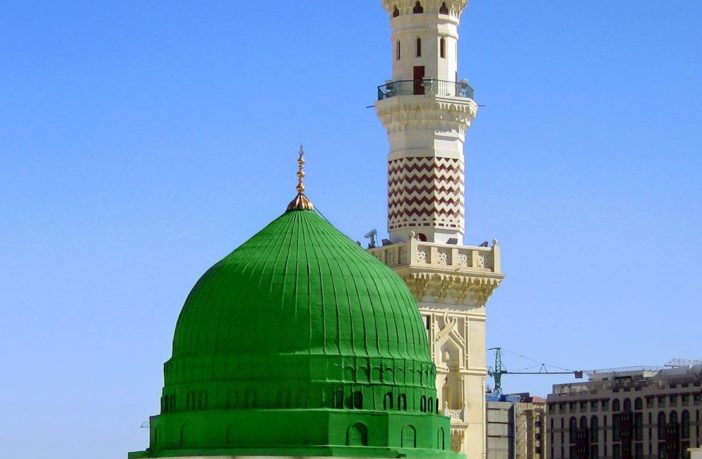by Shaykh Muhammad Shareef bin Farid
The Messenger of Allah, may Allah bless him and grant him peace was born on Monday the 12th of Rabi al-
Awwal and he passed away exactly 63 years later on Monday the 12th of Rabi al-Awwal. Thus, the 12th of Rabi al-Awwal was not only the birthdate of the beloved Prophet, but it was also the day that Allah ta`ala took him from this world. It is for this reason that this date is significant to Muslims worldwide.
The day that Allah manifested this light in existence was Monday, the 12th of Rabi al-Awwal in the year of the Elephant. Shaykh Abdullahi narrated this prophetic tradition without citing the source, in the introduction to his Ta`leem al-Anaam in order to establish the foundation for the immense esteem which Allah ta`ala has for the Messenger of Allah, and to establish the foundation for the obligation of the servants of Allah for showing esteem for him, upon him be peace.
There is no esteem which can be established for a created being greater than it being the first thing which Allah ta`ala created. Although first-ness does not always indicate superiority, however in some cases it does, especially if ‘firstness’ is established as a causative factor.
In other words if the priority of the existence of our master Muhammad, was established as the primordial pattern from which the remainder of created beings were created; then his ‘firstness’ is also a sign of his pre-eminence and ascendancy over the whole of creation. Now this first-ness of the existence of Muhammad, may Allah bless him and grant him peace is a profound principle with the People of Allah ta`ala and is not JUST an intellectual concept.
The first-ness of Muhammad, may Allah bless him and grant him peace is an ontological law which was the first light from which all other created entities were created. This is a matter of spiritual unveiling, gnosis and direct experiential knowledge with the People of Allah, and something veiled from those who lack the knowledge of tasting and who are still under the grip of their lower passions; as one of the realized ones said: “Those who remain ignorant of a thing become its enemy.”
The reality of the prophetic tradition:
)) ﺃﻭﻝ ﻣﺎ ﺧﻠﻖ ﺍﻟﻠﻪُ ﻧﻮﺭُ ﻧﺒِﻴﻚِ ﻳﺎ ﺟﺎﺑﺮ ((
“The first of what Allah created is the light of your Prophet, O Jaabir”; although transmitted by Shaykh Abdullahi without citing the narrator or transmitter; yet it was transmitted by others, and is well known among the people of knowledge.
Furthermore, there have been innumerous prophetic traditions which have been transmitted carrying the same meaning. Among them is what was related by at-Tirmidhi and others on the authority of Ibn Abass that the Messenger of Allah, may Allah bless him and grant him peace said:
)) ﻛُﻨْﺖُ ﻧَﺒِﻴًّﺎ ﻭَﺁﺩَﻡَ ﺑَﻴْﻦَ ﺍﻟﺮُّﻭْﺡِ ﻭَﺍﻟْﺠَﺴَﺪِ ((
“I was a Prophet when Adam was between the spirit and the body.”
In another narration by Ibn Sa`d on the authority of Matruf ibn Abdallah ibn as-Shajeer, that a man once asked the Messenger of Allah, may Allah bless him and grant him peace: “When were you a prophet?” He said:
)) ﺑَﻴْﻦَ ﺍﻟﺮُّﻭْﺡِ ﻭَﺍﻟﻄِّﻴْﻦِ ﻣِﻦْ ﺁﺩَﻡَ ((
“When Adam was between the spirit and clay.”
In all the above prophetic traditions the concept of time as we know it in this world’s life cannot apply, because the time being referenced here is pre-Adamic time before Allah ta`ala created Adam; before the Angels questioned Allah regarding His decision to appoint Adam as His Khalifa in the earth; before Adam was inducted into the realm of instruction of the Divine Names; before the Angels were commanded to prostrate to Adam; before Iblees refused; before Iblees subsequently envied and deceived Adam; before Adam his wife, and Iblees were sent down into this world’s life.
The ‘when-ness’ of Prophet Muhammad, and his ‘first-ness’ can only be understood through spiritual unveiling, and has to be accepted without false interpolation by those who lack spiritual openings. It is simply a matter of having esteem for the immense status of the Prophet with Allah, and which we as Muslims are obligated to have for him as well.
The very act of ‘leveling’ the Prophet, may Allah bless him and grant him peace and attempting to deny the exalted status which Allah ta`ala gave him is a repeat of Iblees’s refusal to recognize the high status of Adam and falls firmly within Iblees’s school of thought.
In fact denying the esteem which Allah ta`ala granted our master Muhammad, is far worse than the refusal of Iblees to prostrate to Adam, based upon the principle that refusal to recognize the status of a being of high status is worse than refusing to recognize the status of one under him. This is because the manifestation of Muhammad, may Allah bless him and grant him peace was the reason that Allah ta`aa created Adam and the entire creation.
If we are obligated to honor our father Adam as well as the sanctity of creation, then we have a greater duty to honor the reason that these were brought into existence – and that is our master Muhammad, may Allah bless him and grant him peace.
It has been related by Qadi `Iyad in his as-Shifa that Abu Muhammad al-Mekki transmitted a prophetic tradition when Adam committed his mistake he said:
)) ﺍَﻟﻠَّﻬُﻢَّ ﺑِﺤَﻖِّ ﻣُﺤَﻤَّﺪٍ ﺍﻏْﻔِﺮْ ﻟِﻲ ﺧَﻄِﻴَﺌﺘِﻲ ﻭَﺗَﻘَﺒَّﻞْ ﺗَﻮْﺑَﺘِﻲ، ﻓَﻘَﺎﻝَ ﻟَﻪُ ﺍﻟﻠّﻪُ ﺗَﻌَﺎﻟَﻰ : ﻣِﻦْ ﺍَﻳْﻦَ ﻋﺮِﻓْﺖَ ﻣُﺤَﻤَّﺪًﺍ؟ ﻗَﺎﻝَ : ﺭَﺃَﻳْﺖُ ﻓِﻲ ﻛُﻞِّ ﻣَﻮْﺿِﻊٍ ﻣِﻦَ ﺍﻟْﺠَﻨَّﺔِ ﻣَﻜْﺘُﻮﺑًﺎ ﻟَﺎ ﺇِﻟَﻪَ ﺇِﻟَّﺎ ﺍﻟﻠّﻪُ ﻣُﺤَﻤَّﺪٌ ﺭَّﺳُﻮْﻝُ ﺍﻟﻠّﻪِ ﻓَﻌَﻠِﻤْﺖُ ﺍَﻧَّﻪُ ﺍَﻛْﺮَﻡُ ﺧَﻠْﻘِﻚَ ﻋَﻠَﻴْﻚَ، ﻓَﺘَﺎﺏَ ﺍﻟﻠّﻪُ ﻋَﻠَﻴْﻪِ ﻭَﻏَﻔَﺮَ ﻟَﻪُ ((
“O Allah by the truth of Muhammad forgive me and my errors and accept my repentance.” Allah ta`ala said to him: “From where did you learn of Muhammad?” He said: “I saw transcribed in every place in Paradise: There is no deity except Allah and Muhammad is the Messenger of Allah. I then knew that he was the most noble of Your creation to You.” As a result Allah relented towards him and forgave him.”
In another narration Adam said:
)) ﻟَﻤَﺎ ﺧَﻠَﻘْﺘَﻨِﻲ ﺭَﻓَﻌْﺖُ ﺭَﺃْﺳِﻲ ﺇِﻟَﻰ ﻋَﺮْﺷِﻚَ، ﻓَﺈِﺫَﺍ ﻓِﻴْﻪِ ﻣَﻜْﺘُﻮْﺏٌ ﻟَﺎ ﺇِﻟَﻪَ ﺇِﻟَّﺎ ﺍﻟﻠّﻪ ﻣُﺤَﻤَّﺪٌ ﺭَّﺳُﻮْﻝُ ﺍﻟﻠّﻪِ ﻓَﻌَﻠِﻤْﺖُ ﺍَﻧَّﻪُ ﻟَﻴْﺲَ ﺃَﺣَﺪٌ ﺍَﻋْﻈِﻢُ ﻗَﺪْﺭًﺍ ﻋِﻨْﺪَﻙَ ﻣِﻤَﻦْ ﺟُﻌِﻠْﺖَ ﺍِﺳْﻤَﻪُ ﻣَﻊَ ﺍِﺳْﻤِﻚَ، ﻓَﺄُﻭْﺣِﻰَ ﺍﻟﻠّﻪُ ﺇِﻟَﻴْﻪِ : ﻭَﻋِﺰَّﺗِﻲ ﻭَﺟَﻠَﺎﻟِﻲ ﺍَﻧَّﻪُ ﻟَﺂﺧِﺮُ ﺍﻟﻨَّﺒِﻴِّﻴْﻦَ ﻣِﻦْ ﺫُﺭِﻳَّﺘِﻚَ ﻭَﻟَﻮْ ﻟَﺎﻩ ُﻣَﺎ ﺧَﻠَﻘْﺘُﻚَ ((
“When You created me I lifted my head to Your Throne and there was written upon it: There is no deity except Allah and Muhammad is the Messenger of Allah. I knew then that there was no one more immense in rank with You than one whom You placed his name with Your Name.” Then Allah revealed to Adam: “By My might and majesty, he is the last of the Prophets from your descendents, and if it were not for him, I would not have created you.”
It has been related by ad-Daylami on the authority of Ibn Abass that the Messenger of Allah, may Allah bless him and grant him peace said:
)) ﺃَﺗَﺎﻧِﻲ ﺟِﺒْﺮِﻳْﻞُ ﻓَﻘَﺎﻝَ : ﻳَﺎ ﻣُﺤَﻤَّﺪُ ! ﻟَﻮْﻟَﺎﻙَ ﻣَﺎ ﺧَﻠَﻘْﺖُ ﺍﻟْﺠَﻨَّﺔَ، ﻭَﻟَﻮْﻟَﺎﻙَ ﻣَﺎ ﺧَﻠَﻘْﺖُ ﺍﻟﻨَّﺎﺭَ ((
“Jibril came to and said: ‘O Muhammad! If it were not for you the Paradise would not have been created. If it were not for you the Fire would not have been created’.”
In fact it states explicitly in the Mifaatih’l-Ghayb:
“The Angels were ordered to make prostration to Adam because of the existence of the light of Muhammad, upon him be peace which existed on the forehead of Adam.”
All this is indication that the priority of the existence of the light of Muhammad, may Allah bless him and grant him peace was and is well known, accepted and understood by the People of Allah and the scholars of the Sunna. No one denies this except the one ignorant of our usuul or one who is veiled and driven away from the tasting of this immense spiritual reality.
For there is no gnosis after the gnosis of Allah ta`ala which is more rewarding, beneficial and advantageous than that which comes from understanding the words of the Messenger of Allah, may Allah bless him and grant him peace:
)) ﺃَﻭَّﻝُ ﻣَﺎ ﺧَﻠَﻖَ ﺍﻟﻠﻪُ ﻧُﻮْﺭُ ﻧَﺒِﻴِّﻚِ ﻳَﺎ ﺟَﺎﺑِﺮُ ((
“The first of what Allah created is the light of your Prophet, O Jaabir”
It is for this reason Shaykh Abdullahi Dan Fodio began his immense work, the Ta`leem al-Anaam with this prophetic tradition in order to indicate to extraordinary esteem which Allah ta`ala has for our beloved Prophet, may Allah bless him and grant him peace. Although, the shaykh did not cite the source of his prophetic tradition it has been related in another tradition using a slight variation of expression narrated by Abd’r-Razaaq with his chain of authority on the authority of Jaabir ibn Abdallah who said:
“I once said: ‘O Messenger of Allah, I ask you by my father and mother, inform me about the fist thing which Allah created before all things?’
He said: ‘O Jaabir, verily Allah ta`ala created from His Light the light of your Prophet before everything. He then placed this light revolving with the Divine Decree wherever Allah desired. At that time there was no Guarded Tablet, Primordial Pen, Paradise, Fire, Angel, heaven, earth, sun, moon, jinn or mankind. And when Allah desired to create creation, he divided this light into four parts.
He then created from the first part the Primordial Pen; from the second part the Guarded Tablet, and from the third part the Throne. He then divided the fourth part into four parts. He created from the first part those who carry the Throne, from the second part the Footstool, and from the third part remaining the Angels. He then divided the fourth part into four parts. He created the heavens from the first part, the earths from the second part and from the third part he created the Paradise and the Fire. He then divided the fourth part into four parts. He then created from the first part the light of vision of the believers, from the second part the light of their hearts, which direct experiential knowledge of Allah, and from the third part He created the light of their humanity which the Divine Unity concealed in the expression: There is no deity except Allah, Muhammad is the Messenger of Allah’.”
This was also narrated in the al-Muwaahib.
Thus, the manifestation of the original light of the Prophet occurred before the creation of all things, while the manifestation of his physical person occurred on Monday, the 12th of Rabi al-Awwal in the year of the Elephant. It is therefore a blessed day and should be acknowledged as such.
Thus, what is the legal judgment regarding recognizing or celebrating the mawlid of the Prophet? SHEHU Uthman Dan Fodio raised the same question in his magnus opus, the Ihya as-Sunna wa Ikhmad al-Bida` where he said:
If you were to say: “What is the legal judgment concerning what the people do during the month of Rabi` ‘l-Awwal on the day of Prophet’s birthday (al-mawlid) or on the seventh day of the mawlid where people gather together for remembrance of Allah (dhikr) and the food which is prepared for that purpose?”
I say: That is a reprehensible innovation if it is free of any form of disobedience (ma`siyya). It is said that the answer is that the practice of the Mawlid of the noble Prophet, may Allah bless him and grant him peace is a highly recommended good innovation (bid`a hasana manduuba) when it is free of every disobedience. As for what the people have made a habit in these times where men and women mix freely, Allah forbid that any scholar would make that permissible.
It says in the al-Madkhal, “Generally what the people have invented from innovation is their false belief to be among the momentous acts of worship (akbar ‘l-`ibaadaat) and manifesting the rites of Islam is what they do during the month of Rabi` ‘l-Awwal from the Mawlid of the Prophet, may Allah bless him and grant hi peace. This has been included among the innovations (bid`a) and the forbidden things (muharramaat).”
He continued, “It is necessary that when this noble month comes that it be honored, ennobled and respect it with deserving respect. This is by following the Prophet, may Allah bless him and grant him peace in that he used to single out times of blessing by increasing in performing acts of righteousness and generosity.”
If you were to say, “What is the legal judgment concerning those who prepare food only on the day of the mawlid. He intends by that the recognition of the mawlid and invites his Muslim brothers to eat along with that being free of every kind of disobedience?”
I say: this is a reprehensible innovation or an permissible innovation. The latter is the preferred decision (al-mukhtaar).
The former decision was the opinion of the author of the al-Madkhal because he said, “If food is prepared only and one intends by that to recognize the Mawlid and the Muslim brothers are then invited even when it is free of every kind of disobedience – it is still an innovation because of the intention only. This is because that is making increase in the religion and it is not among the behavior of the early community (as-Salaf). For following in the footsteps of the Salaf is paramount. No, rather it is obligatory.”
Thus, it is clear that SHEHU Uthman Dan Fodio considered it permissible to acknowledge the mawlid of the Prophet, may Allah bless him and grant him peace, remembering the Prophet and transmitting his biography on that day, but also by transmitting those prophetic traditions such as I cited in the beginning which discuss the manifestation of the Light of the Prophet. We will, Allah willing look at this in further detail…
…to be continued…
Commentary Upon the Ta`leem al-Anaam:
https://www.academia.edu/11505393/Taleem_al-Anaam_the_Education_of_Mankind_Rega
rding_Allahs_Immense_Esteem_of_the_Prophet_by_Shaykh_Abdullahi_ibn_Fuduye




